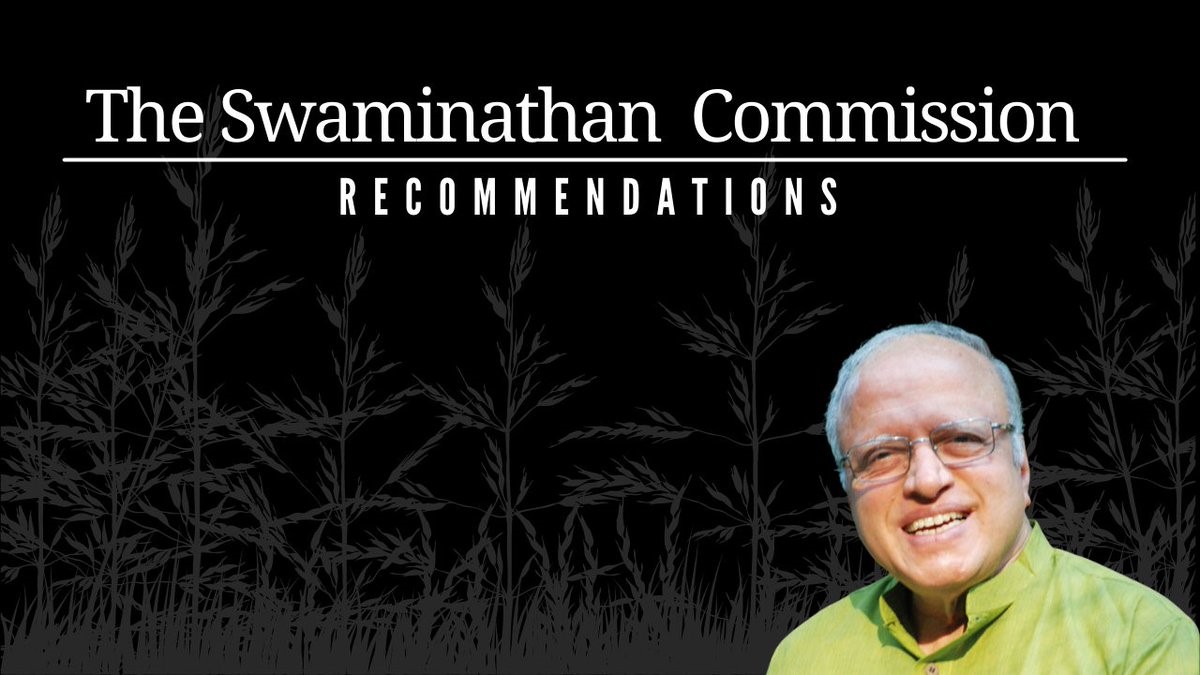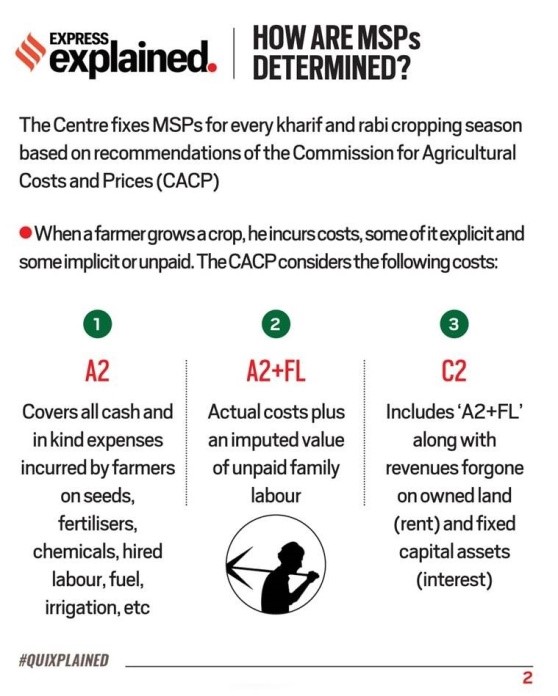Description

Disclaimer: Copyright infringement not intended.
Context
- Farmers in Punjab demanded a law to ensure the procurement of all crops at Minimum Support Price (MSP) and pricing based on Dr. Swaminathan Commission's recommendations.
MS Swaminathan Commission
- The Swaminathan Commission, officially known as the National Commission on Farmers, was established in 2004 under the chairmanship of Prof. M.S. Swaminathan, a renowned agricultural scientist.
- The Commission was tasked with assessing the state of Indian agriculture and suggesting measures for achieving sustainable growth and improving farmers' livelihoods. One of the key recommendations of the Commission was related to the pricing of agricultural produce, particularly the Minimum Support Price (MSP).
- The Commission recommended that MSP should be set at a level that ensures a minimum 50% profit margin over the comprehensive cost of production. This recommendation, known as the "Swaminathan Formula," aimed to provide farmers with remunerative prices for their produce and improve their income security.
- However, the implementation of this recommendation has been a matter of debate and contention, with farmers' groups often demanding its full implementation by the government.

MS Swaminathan Recommendations
Investment in Agriculture Infrastructure:
- Swaminathan Report advocates substantial increase in public investment in irrigation, drainage, land development, water conservation, research, development, and road connectivity in agriculture.
Enforcement of Minimum Support Price (MSP):
- The report emphasizes the need for enforcing MSP throughout the country to impart dynamism to agriculture.
Safety Net for Farmers:
- Recommends a safety net to safeguard the interests of crops, people, and regions likely to be affected by globalization.
C2+50% Formula:
- The core of the report includes the concept of C2 (comprehensive cost) plus 50% as the Minimum Support Price.

Market Reforms:
- Recommends establishing One Nation-One Market to address cartelization among traders.
- Calls for developing domestic and international markets for local produce, moving towards a Single Indian Market.
Land Reforms:
- Advocates distributing ceiling-surplus and waste lands.
- Preventing diversion of prime agricultural land and forests for non-agricultural purposes.
- Ensuring grazing rights and seasonal access to forests for tribals and pastoralists.
Water Management:
- Recommends comprehensive reforms for sustained and equitable access to water.
- Proposes mandatory rainwater harvesting and recharge of aquifers, including the "Million Wells Recharge" program.
Credit and Insurance:
- Advocates expanding formal credit system outreach to reach the poor.
- Calls for reducing crop loan interest rates to 4% with government support.
- Suggests establishing an Agriculture Risk Fund for relief after natural calamities.

Livelihood Support:
- Recommends an integrated credit-cum-crop-livestock-human health insurance package.
- Promotes sustainable livelihoods by improving financial services, infrastructure, and investments in human development.
Health and Welfare:
- Recommends affordable health insurance and revitalizing primary healthcare centers, extending the National Rural Health Mission to suicide hotspot locations.
Market Interventions:
- Calls for Market Intervention Schemes (MIS) for life-saving crops and a Price Stabilization Fund to protect farmers from price fluctuations.
Technology and Knowledge:
- Recommends promoting low-risk, low-cost technologies for maximum income to farmers.
- Advocates setting up Village Knowledge Centres (VKCs) in farmers' distress hotspots for dynamic information and guidance.
Labour Market Reforms:
- Suggests improving labour market functioning without eroding core labour standards.
Bioresources Conservation:
- Encourages community-based breed conservation through use.
|
PRACTICE QUESTION
Q. Which of the following recommendations are part of the MS Swaminathan Report?
A) Advocating for One Nation-One Market to address cartelization among traders.
B) Distributing ceiling-surplus and waste lands for agricultural purposes.
C) Mandatory rainwater harvesting and recharge of aquifers through the "Million Wells Recharge" program.
D) Expanding formal credit system outreach to reach the poor.
Select the correct answer using the codes below:
- A and B only
- B and C only
- A, B, and C only
- A, B, C, and D
Answer: 3) A, B, and C only
|














